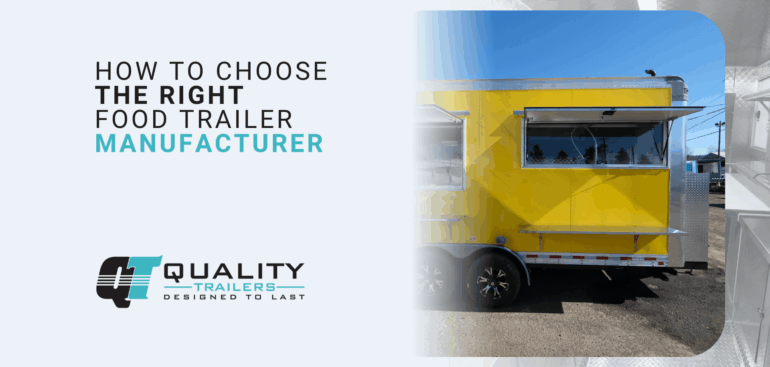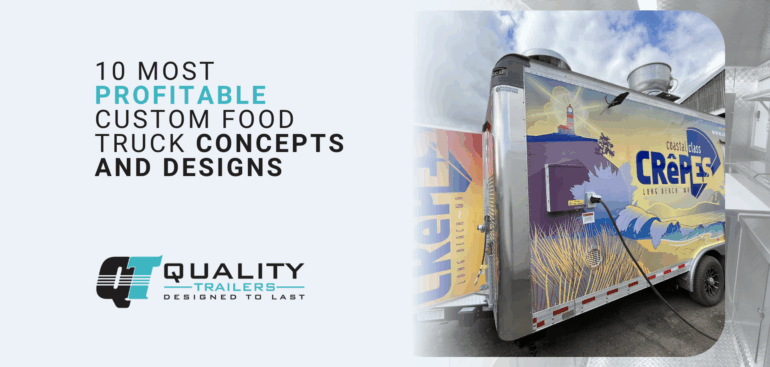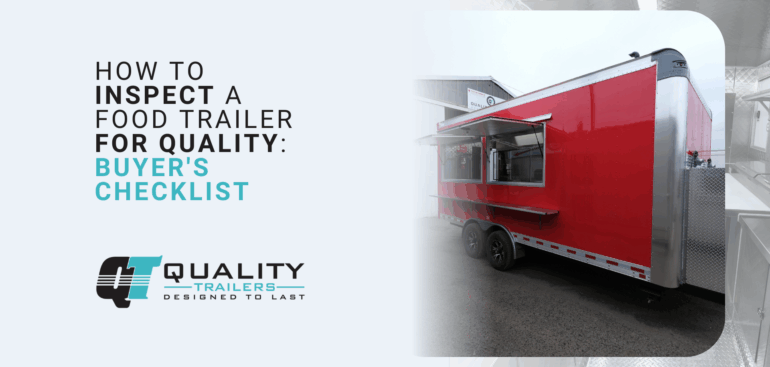Selecting the right food trailer manufacturer represents one of the most critical decisions in launching your mobile food business. This choice impacts not only your initial investment but also your operational efficiency, long-term maintenance costs, and ultimately, your business success. The difference between partnering with an experienced, reputable manufacturer and choosing based solely on price can mean years of reliable service versus constant repairs and lost revenue.
The food trailer manufacturing industry includes options ranging from small custom shops to large-scale production facilities. Each type offers different advantages, and understanding these differences helps align your choice with your specific business needs. Whether you’re launching your first mobile venture or expanding an existing operation, the manufacturer you select becomes a crucial partner in your entrepreneurial journey.
Understanding the Food Trailer Manufacturing Landscape
The modern food trailer manufacturing industry has evolved significantly over the past decade, driven by the explosive growth of mobile food businesses. Today’s manufacturers range from specialized custom builders focusing on unique concepts to production-oriented facilities offering standardized models. Understanding this landscape helps identify which type of manufacturer best suits your needs and budget.
Regional differences also play a role in manufacturer selection. Some areas have developed clusters of food trailer builders due to favorable regulations, available skilled labor, or proximity to suppliers. These regional specialties often translate into expertise with specific types of builds or better pricing on certain features. Researching manufacturers both locally and nationally provides a comprehensive view of available options and helps ensure you find the best match for your project.
Evaluating Manufacturer Experience and Track Record
When assessing potential manufacturers, their experience serves as a fundamental indicator of capability and reliability. Manufacturer experience encompasses not just years in business but also the variety and complexity of projects completed. A manufacturer with 20 years building utility trailers might have less relevant experience than one with five years focused exclusively on food service applications.
Look beyond simple longevity to examine the types of projects in their portfolio. Have they built trailers similar to your concept? Do they understand the specific requirements of your cuisine type or service model? Experienced manufacturers can offer valuable insights during the design phase, helping avoid common pitfalls and suggesting improvements based on similar successful projects. Understanding how to choose the right food trailer for your business needs includes evaluating whether a manufacturer’s experience aligns with your specific requirements.
The Importance of Manufacturing Certifications
Manufacturing certifications provide objective validation of a builder’s capabilities and commitment to quality standards. While not all certifications carry equal weight, certain credentials indicate adherence to industry best practices and regulatory compliance. Look for certifications related to welding standards, electrical work, and food service equipment installation.
State-specific certifications often prove most relevant for food trailer manufacturers. Many states require specific licenses for installing propane systems, commercial electrical work, or plumbing in mobile food units. Manufacturers holding these certifications can complete your entire build in-house rather than subcontracting critical components. The National Fire Protection Association provides standards that certified manufacturers should follow for safe food trailer construction.
Researching Manufacturer Reputation
A manufacturer’s reputation reflects the cumulative experience of their customers and provides insights beyond marketing materials. Start by requesting references from recent customers with similar projects. Quality manufacturers willingly share references and may even arrange site visits to completed trailers. Speaking directly with previous customers reveals crucial information about communication, timeline adherence, and post-delivery support.
Online research complements direct references but requires careful interpretation. Look for patterns in feedback rather than focusing on individual reviews. Pay attention to how manufacturers respond to negative feedback, as this indicates their commitment to customer satisfaction. Industry forums and food truck operator groups often provide unfiltered discussions about manufacturer experiences. The best materials for durable food trailer builds often correlate with manufacturers who maintain strong reputations for quality construction.
Analyzing Trailer Manufacturer Reviews
Trailer manufacturer reviews provide valuable insights when properly analyzed. Look beyond star ratings to understand specific strengths and weaknesses. Reviews mentioning detailed experiences with the build process, communication, and problem resolution offer more value than generic praise or complaints. Pay particular attention to reviews from operators who’ve owned their trailers for extended periods, as these reflect long-term build quality.
Consider the source and context of reviews. Reviews on manufacturer websites might be curated, while third-party platforms often provide more balanced perspectives. Industry-specific review sites carry more weight than general business review platforms. Remember that satisfied customers less frequently leave reviews, so a moderate number of positive reviews might indicate broader satisfaction than apparent at first glance.
Assessing Production Capacity and Timelines
Understanding a manufacturer’s production capacity helps set realistic expectations for your project timeline. Smaller custom shops might offer more personalized attention but could have longer lead times due to limited production capacity. Larger facilities might complete builds faster but with less flexibility for customization. Balance your timeline needs with your desires for customization and personal attention.
Production capacity also affects a manufacturer’s ability to handle warranty work or modifications. Manufacturers operating at full capacity might struggle to address issues promptly, impacting your business operations. Ask about typical lead times, how they handle rush orders, and their capacity for warranty work. Understanding Portland custom food trailer design trends helps gauge whether a manufacturer stays current with industry innovations despite their production load.
Design Capabilities and Customization Options
The best food trailer manufacturer for your project offers the right balance of design expertise and customization flexibility. Some manufacturers excel at fully custom builds, working from your sketches to create unique solutions. Others specialize in modified standard designs that balance customization with proven layouts. Understanding their design process helps determine if their approach matches your vision.
Evaluate their design tools and processes. Modern manufacturers often use CAD software to create detailed plans you can review and modify before construction begins. This technology reduces miscommunication and allows virtual walk-throughs of your trailer. Ask about their revision process and how they handle design changes during construction. The Oregon custom food trailer permitting process often requires detailed plans that experienced manufacturers can provide efficiently.
Quality Control and Build Processes
Manufacturing quality depends heavily on systematic build processes and quality control measures. Reputable food trailer builders implement stage-gate processes where builds pass inspection at critical points before proceeding. This approach catches issues early when corrections are simpler and less expensive. Ask potential manufacturers about their quality control procedures and who performs inspections.
Documentation throughout the build process indicates professional operations. Progress photos, inspection reports, and compliance certificates should be standard. Some manufacturers provide customer portals where you can track your build’s progress in real-time. This transparency reduces anxiety and allows early identification of any concerns. Quality manufacturers welcome customer inspections at key milestones rather than hiding the build process.
Material Selection and Sourcing Standards
The materials used in your food trailer directly impact its longevity, maintenance requirements, and operational efficiency. Leading manufacturers maintain relationships with quality suppliers and can explain why they choose specific materials. They should offer options for different budget levels while explaining the trade-offs between choices.
Ask about their standard materials and available upgrades. How do they source stainless steel? What grade of aluminum do they use for exterior skins? What insulation options do they offer? Manufacturers who can knowledgeably discuss material choices demonstrate expertise beyond basic assembly. They should also be transparent about material costs and how choices affect your final price.
Warranty and Support Considerations
A manufacturer’s warranty reflects their confidence in their product and commitment to customer support. Look beyond warranty length to understand what’s actually covered. Some manufacturers offer comprehensive warranties covering all their work, while others exclude numerous components. The best warranties clearly spell out coverage, claim procedures, and what actions might void protection.
Post-delivery support proves equally important as warranty coverage. Will the manufacturer provide technical support by phone? Can they source replacement parts? Do they offer training on maintenance procedures? Some manufacturers maintain service networks or traveling technicians who can perform warranty work at your location. Consider how to start a mobile food trailer business from scratch includes planning for ongoing manufacturer support needs.
Pricing Transparency and Value Assessment
While price shouldn’t be the sole selection factor, understanding cost structures helps evaluate overall value. Reputable manufacturers provide detailed quotes breaking down material costs, labor, and equipment. This transparency allows accurate comparison between manufacturers and helps identify where money goes in your build. Be wary of quotes that seem significantly below market rates, as these often indicate cut corners or hidden costs.
Value extends beyond initial price to include factors like build quality, warranty coverage, and ongoing support. A slightly higher-priced trailer from a reputable manufacturer often provides better long-term value through reduced maintenance costs and longer service life. Consider total cost of ownership rather than just purchase price when evaluating options. The SBA’s small business guide offers frameworks for evaluating major business investments like food trailers.
Communication and Project Management
Effective communication throughout the build process prevents misunderstandings and ensures your vision becomes reality. Evaluate potential manufacturers’ communication styles during initial conversations. Do they respond promptly? Do they ask clarifying questions? Do they provide clear, detailed answers? These early interactions predict communication quality during your build.
Project management capabilities separate professional manufacturers from casual builders. Look for manufacturers who assign dedicated project managers, provide regular updates, and maintain clear change order processes. They should have systems for documenting decisions, tracking modifications, and managing timelines. Poor project management leads to delays, cost overruns, and features not matching expectations.
Compliance and Code Expertise
Food trailers must meet numerous health, safety, and transportation regulations that vary by location. Experienced food trailer manufacturers understand these requirements and build compliance into their standard processes. They should be familiar with health department requirements in your operating area and able to ensure your trailer meets all applicable codes.
Ask potential manufacturers about their experience with your local regulations. Can they provide health department-approved plans? Do they understand fire suppression requirements for your equipment configuration? Will they assist with the permitting process? Manufacturers who can’t confidently discuss regulatory compliance likely lack necessary experience. The FDA Food Code provides baseline standards that knowledgeable manufacturers should understand.
Innovation and Technology Integration
The food service industry continues evolving, and forward-thinking manufacturers stay current with trends and technologies. Look for builders who understand modern POS systems, online ordering integration, and energy-efficient equipment options. They should be able to discuss how design accommodates technology and suggest innovations that might benefit your operation.
Innovation extends beyond technology to include construction techniques, materials, and design approaches. Manufacturers who attend industry trade shows, maintain equipment partnerships, and invest in staff training typically offer more innovative solutions. Ask about recent innovations they’ve implemented and how they stay current with industry trends. Understanding the future of mobile dining custom food trucks helps evaluate whether a manufacturer embraces innovation.
Red Flags to Avoid When Selecting a Manufacturer
- Reluctance to provide references or allow visits to completed builds, indicating potential quality issues or dissatisfied customers • Extremely low quotes that seem too good to be true, often hiding cut corners or substandard materials • Pressure to make immediate decisions or large deposits before providing detailed plans and specifications • Lack of proper licenses, insurance, or certifications required for commercial food service builds • Poor communication during the sales process, which typically worsens during production
Making Your Final Decision
Selecting your food trailer manufacturer requires balancing multiple factors including experience, reputation, capabilities, and price. Create a comparison matrix rating each manufacturer across key criteria important to your project. Weight factors based on your priorities, whether that’s customization capability, quick delivery, or long-term support.
Trust your instincts alongside objective evaluation. The manufacturer you choose becomes a partner in your business success, so cultural fit matters. Do you feel comfortable with their communication style? Do they seem genuinely interested in your success? These intangible factors often prove as important as technical capabilities. Learn about 15 things to know before buying a mobile food truck for additional factors to consider.
Building Long-Term Manufacturer Relationships
The best manufacturer relationships extend beyond initial delivery to encompass ongoing support, future modifications, and potential fleet expansion. Manufacturers who view themselves as long-term partners provide valuable resources as your business grows. They can offer advice on equipment upgrades, suggest operational improvements, and provide preferential scheduling for additional units.
Consider how potential manufacturers support customer success beyond construction. Do they maintain owner networks for peer support? Do they offer training programs? Can they provide marketing materials showcasing your custom build? These value-added services indicate manufacturers invested in customer success rather than just completing transactions.
Regional Considerations in Manufacturer Selection
Geographic location affects manufacturer selection in several ways. Local manufacturers offer advantages like easier site visits, reduced delivery costs, and familiarity with regional regulations. However, specialized manufacturers in distant locations might better suit unique concepts. Balance convenience against expertise when considering geographic factors.
Climate considerations also matter. Manufacturers in similar climates to your operating area better understand insulation needs, ventilation requirements, and weather-related design features. They’re more likely to have experience with equipment performance in your conditions. The Portland food trailers food culture impact demonstrates how regional expertise enhances build quality.
Financing and Payment Considerations
Understanding manufacturer payment terms helps plan your project financing. Most require substantial deposits to begin construction, with progress payments at defined milestones. Some manufacturers have relationships with financing companies familiar with food trailer investments. Others might offer flexible payment terms for qualified buyers.
Discuss payment expectations early in the selection process. Understand what triggers progress payments and what recourse exists if milestones aren’t met satisfactorily. Reputable manufacturers provide clear payment terms in written contracts. Be cautious of manufacturers requiring full payment before delivery or those unwilling to tie payments to measurable progress.
Preparing for Manufacturer Engagement
Successful manufacturer relationships begin with thorough preparation on your part. Develop clear vision for your concept, including menu, service style, and operational requirements. Create a realistic budget including contingencies for unexpected costs. Research equipment options and have preferences identified. This preparation enables productive initial conversations and accurate quotes.
Compile questions addressing your specific concerns and priorities. Prepare to discuss your business plan, as experienced manufacturers can offer valuable operational insights. The more prepared you are, the better manufacturers can assess whether they’re the right fit for your project. Discover how to start a food business with a custom food trailer to ensure you’re fully prepared for manufacturer discussions.
Why Choose Quality Trailers Inc as Your Food Trailer Manufacturer
When searching for a food trailer manufacturer that combines experience, innovation, and customer focus, Quality Trailers Inc stands out with over 23 years of manufacturing excellence. Since transitioning to food trailer specialization in 2010, we’ve built hundreds of successful mobile food businesses, each reflecting our commitment to quality, compliance, and customer success. Our family-owned approach means you work directly with people invested in your project’s success. Visit our homepage to explore our extensive portfolio.
Our comprehensive capabilities include in-house CAD design, certified welding, and expert installation of all food service systems. We maintain manufacturing certifications required for commercial builds and stay current with health department requirements across multiple states. Our production capacity allows reasonable lead times without sacrificing the personalized attention your project deserves. Every build includes detailed documentation, progress updates, and thorough quality control inspections. Request a custom quote to experience our transparent pricing and professional approach.
At Quality Trailers Inc, we view ourselves as partners in your success, not just equipment suppliers. Our innovation includes pioneering solar panel integration in 2016, demonstrating our commitment to helping operators reduce operating costs. We provide comprehensive warranties, ongoing technical support, and assistance with future modifications as your business grows. Our reputation among food trailer builders reflects consistent delivery of durable, efficient, and profitable mobile food solutions. Contact us today to discuss how we can build profitable food businesses with quality trailers that exceed your expectations.
Frequently Asked Questions
How far in advance should I contact a food trailer manufacturer?
Most reputable manufacturers have lead times of 3-4 months from deposit to delivery. However, initiating conversations 6-8 months before your desired launch date allows time for design iterations, permitting, and potential production delays. Seasonal demand also affects timelines, with spring and summer typically being busiest for food trailer builders.
What should I expect to pay for a quality custom food trailer?
Custom food trailers typically range from $50,000 to $150,000 depending on size, equipment, and customization level. Basic builds with standard equipment might start around $50,000, while fully customized trailers with high-end equipment can exceed $200,000. Focus on value and long-term operational costs rather than just initial price.
How can I verify a manufacturer’s credentials and certifications?
Request copies of relevant licenses, certifications, and insurance documents. Verify state contractor licenses through official databases. Check welding certifications with issuing organizations. Contact references and ask about their experience with code compliance and inspections. Legitimate manufacturers readily provide verification documentation.
What’s the difference between local and national food trailer manufacturers?
Local manufacturers offer advantages like easier communication, site visits, and familiarity with regional regulations. National manufacturers might provide better pricing through volume purchasing and access to specialized expertise. The best choice depends on your specific needs, with complex custom builds often benefiting from specialized expertise regardless of location.
Should I visit the manufacturer’s facility before making a decision?
Facility visits provide invaluable insights into build quality, organization, and professionalism. Observing active builds reveals construction methods and quality control processes. Meeting the team building your trailer establishes relationships beneficial throughout the project. While not always feasible for distant manufacturers, visits are highly recommended when possible.




